Ethics of Organizational Development - Organizational Change and Development - Manu Melwin Joy
- 1. Ethics of organizational development
- 2. Prepared By Kindly restrict the use of slides for personal purpose. Please seek permission to reproduce the same in public forms and presentations. Manu Melwin Joy Assistant Professor Ilahia School of Management Studies Kerala, India. Phone – 9744551114 Mail – manu_melwinjoy@yahoo.com
- 3. Ethics of OD • RESPONSIBILITY TO OURSELVES – Acting with integrity and Authenticity. – Striving for self-knowledge and personal growth – Asserting individual interests in ways that are fair and equitable.
- 4. Ethics of OD • RESPONSIBILITY FOR PROFESSIONAL DEVELOPMENT AND COMPETENCE – Accepting responsibility for the consequence of our acts. – Developing and maintaining individual competence and establishing cooperative relations with other professionals. – Recognizing our own needs and desires, and dealing with them responsibly in the performance of our professional roles.
- 5. Ethics of OD • RESPONSIBILTY TO CLIENTS AND SIGNIFICANT OTHERS. • Serving the long-term well- being of our client system and stakeholders. • Conducting ourselves honestly, responsibly, and with appropriate openness. • Establishing mutual agreement on a fair contract.
- 6. Ethics of OD • RESPONSIBILITY TO THE OD COMMUNITY. – Contributing to the continuing professional development of other practitioners and field of practice. – Promoting the sharing of professional knowledge and skill. – Working with other professionals in ways that exemplify what the profession stands for.
- 7. Ethics of OD • SOCIAL RESPONSIBILITY. – Acting with sensitivity to the consequences of our recommendations for our client system and the larger systems within they are a subsystem. – Acting with awareness of our cultural filters and with sensitivity to multinational and multicultural differences and their implications. – Promoting justice and serving the well-being of all life on earth. -
- 8. The Ethics of OD: Summary of the Debate OD is unethical • Imposes values of the organization; coercive and manipulative • Potential for abuse OD is ethical • The imposition of values is an inherent part of life, especially on the job • Abuse comes from individuals, not from the technique itself, which is neither good nor evil
- 9. Antecedents Process Consequences Ethical Dilemmas • Misrepresentation • Misuse of data • Coercion • Value and goal conflict • Technical ineptness Role Episode • Role conflict • Role ambiguity Role of the Change Agent Role of the Client System Values Goals Needs Abilities A Model of Ethical Dilemmas









